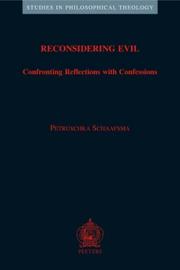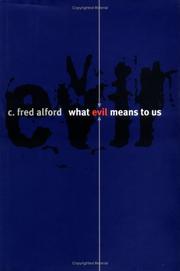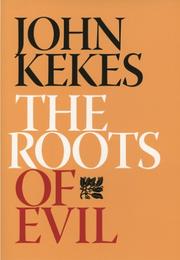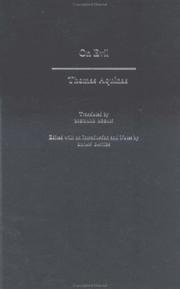| Listing 1 - 10 of 274 | << page >> |
Sort by
|
Book
ISBN: 1628940956 9781628940954 9781628940930 162894093X 9781628940947 1628940948 Year: 2014 Publisher: New York
Abstract | Keywords | Export | Availability | Bookmark
 Loading...
Loading...Choose an application
- Reference Manager
- EndNote
- RefWorks (Direct export to RefWorks)
This book argues that the epistemological framework that permits us to see others as ''evil'' also resituates our own moral compass and reframes our moral world such that we can justify performing violent deeds, which we would readily demonize in others, as the heroics of eradicating evil. When conflict is understood positively as the confrontation of differences, an unavoidable and indeed desirable consequence of the rich tapestry of earthly life, then a discussion can open as to how to navigate the countless confrontations of difference in the most skillful way. Through this lens, violence c
Good and evil. --- Evil --- Wickedness --- Ethics --- Philosophy --- Polarity --- Religious thought
Book
ISBN: 0429899114 0429474342 1782415009 9781782415008 9780429913341 0429913346 9781782203957 1782203958 1781816328 9780429474347 9780429927577 Year: 2016 Publisher: London [England]
Abstract | Keywords | Export | Availability | Bookmark
 Loading...
Loading...Choose an application
- Reference Manager
- EndNote
- RefWorks (Direct export to RefWorks)
"In today's world where every form of transgression enjoys a psychological motive and rational justification, psychoanalysis stands alone in its ability to uncover the hidden motives that inform individual and social collective behaviour. Both in theory and practice, it bears witness to the impact of anonymity on the potential for perpetration, especially when others are experienced as faceless, disposable objects whose otherness is, at bottom, but a projection, displacement, and denial of our own interiority-in short, the evil within. In keeping with this perspective, Ethics of Evil rejects facile rationalizations of violence; it also rejects the idea that evil, as a concept, is inscrutable or animated by demonic forces. Instead, it evaluates the moral framework in which evil is situated, providing a descriptive understanding of it as a plurality and a depth psychological perspective on the threat it poses for our well-being and ways of life. In so doing, it also fashions and articulates an ethical stance that recognizes the intrinsic link between human freedom and the potential for evil. The essays collected in Ethics of Evil argue that moralizing evil is one of the most important agendas of our time.Contributors: Robin McCoy Brooks, Aner Govrin, Henry Zvi Lothane, Dan Merkur, Jon Mills, Ronald C. Naso, and Robert Prince."--Provided by publisher.
Good and evil. --- Evil --- Wickedness --- Ethics --- Philosophy --- Polarity --- Religious thought

ISBN: 9042011386 9401201005 1417564288 9781417564286 Year: 2004 Publisher: Amsterdam Rodopi
Abstract | Keywords | Export | Availability | Bookmark
 Loading...
Loading...Choose an application
- Reference Manager
- EndNote
- RefWorks (Direct export to RefWorks)
Written across the disciplines of art history, literature, philosophy, sociology, and theology, the ten essays comprising the collection all insist on multidimensional definitions of evil. Taking its title from a moment in Shakespeare's Tempest when Prospero acknowledges his responsibility for Caliban, this collection explores the necessarily ambivalent relationship between humanity and evil. To what extent are a given society's definitions of evil self-serving? Which figures are marginalized in the process of identifying evil? How is humanity itself implicated in the production of evil? Is evil itself something fundamentally human? These questions, indicative of the kinds of issues raised in this collection, seem all the more pressing in light of recent world events. The ten essays were originally presented at the First Global Conference on Perspectives on Evil and Human Wickedness, held in March 2000 in Lady Margaret Hall, Oxford University.
Good and evil. --- Evil --- Wickedness --- Ethics --- Philosophy --- Polarity --- Religious thought

ISBN: 9042918403 9789042918405 Year: 2006 Volume: 36 Publisher: Leuven: Peeters,
Abstract | Keywords | Export | Availability | Bookmark
 Loading...
Loading...Choose an application
- Reference Manager
- EndNote
- RefWorks (Direct export to RefWorks)
Religious studies --- Good and evil. --- Good and evil --- Evil --- Wickedness --- Ethics --- Philosophy --- Polarity --- Religious thought

ISBN: 9024277205 Year: 1991 Publisher: Kampen Kok Agora
Abstract | Keywords | Export | Availability | Bookmark
 Loading...
Loading...Choose an application
- Reference Manager
- EndNote
- RefWorks (Direct export to RefWorks)
Culture --- Education --- Good and evil. --- Philosophy. --- Good and evil --- Evil --- Wickedness --- Ethics --- Philosophy --- Polarity --- Religious thought

ISBN: 0801434300 1501720511 Year: 1997 Publisher: Ithaca (N.Y.): Cornell university press
Abstract | Keywords | Export | Availability | Bookmark
 Loading...
Loading...Choose an application
- Reference Manager
- EndNote
- RefWorks (Direct export to RefWorks)
Good and evil. --- Good and evil --- Evil --- Wickedness --- Ethics --- Philosophy --- Polarity --- Religious thought
Book
ISBN: 2738499104 9782738499103 Year: 2001 Publisher: Paris: L'Harmattan,
Abstract | Keywords | Export | Availability | Bookmark
 Loading...
Loading...Choose an application
- Reference Manager
- EndNote
- RefWorks (Direct export to RefWorks)
Good and evil. --- Good and evil --- Evil --- Wickedness --- Ethics --- Philosophy --- Polarity --- Religious thought --- Bien et mal

ISBN: 0801443687 9780801471308 0801471303 9780801471315 0801471311 9780801473814 0801473810 9780801473814 9780801443688 132252310X 9781322523101 Year: 2005 Publisher: Ithaca, NY
Abstract | Keywords | Export | Availability | Bookmark
 Loading...
Loading...Choose an application
- Reference Manager
- EndNote
- RefWorks (Direct export to RefWorks)
"Evil is the most serious of our moral problems. All over the world cruelty, greed, prejudice, and fanaticism ruin the lives of countless victims. Outrage provokes outrage. Millions nurture seething hatred of real or imagined enemies, revealing savage and destructive tendencies in human nature. Understanding this challenges our optimistic illusions about the effectiveness of reason and morality in bettering human lives. But abandoning these illusions is vitally important because they are obstacles to countering the threat of evil. The aim of this book is to explain why people act in these ways and what can be done about it."-John Kekes The first part of this book is a detailed discussion of six horrible cases of evil: the Albigensian Crusade of about 1210; Robespierre's Terror of 1793-94; Franz Stangl, who commanded a Nazi death camp in 1943-44; the 1969 murders committed by Charles Manson and his "family"; the "dirty war" conducted by the Argentinean military dictatorship of the late 1970's; and the activities of a psychopath named John Allen, who recorded reminiscences in 1975. John Kekes includes these examples not out of sensationalism, but rather to underline the need to hold vividly in our minds just what evil is. The second part shows why, in Kekes's view, explanations of evil inspired by Christianity and the Enlightenment fail to account for these cases and then provides an original explanation of evil in general and of these instances of it in particular.
Good and evil. --- Evil --- Wickedness --- Ethics --- Philosophy --- Polarity --- Religious thought --- General ethics

ISBN: 0520935551 1597348643 9780520935556 1417522836 9781417522835 9780520226326 0520226321 9780520226340 0520226348 0520226348 9781597348645 Year: 2001 Publisher: Berkeley University of California Press
Abstract | Keywords | Export | Availability | Bookmark
 Loading...
Loading...Choose an application
- Reference Manager
- EndNote
- RefWorks (Direct export to RefWorks)
This innovative volume will be welcomed by moral and political philosophers, social scientists, and anyone who reflects seriously on the twentieth century's heavy burden of war, genocide, ethnic cleansing, and other evidence of people's desire to harm one another.
Good and evil. --- Good and evil --- Philosophy --- Philosophy & Religion --- Ethics --- Evil --- Wickedness --- Polarity --- Religious thought

ISBN: 0199725802 1282367293 9786612367298 0195357922 1429461810 9781429461818 0195158539 0195091833 9780195357929 9781282367296 6612367296 0197740316 9780199725809 9780195158533 9780197740316 Year: 2003 Publisher: Oxford ; New York : Oxford University Press,
Abstract | Keywords | Export | Availability | Bookmark
 Loading...
Loading...Choose an application
- Reference Manager
- EndNote
- RefWorks (Direct export to RefWorks)
The 'De Malo' represents some of Aquinas' most mature thinking on goodness, badness and human agency. This text offers Richard Regan's English translation, based on the Leonine Commission's authoritative edition of the Latin text. Brian Davies has provided an extensive introduction and notes.
Good and evil. --- Sin --- Evil --- Wickedness --- Ethics --- Philosophy --- Polarity --- Religious thought --- Christianity. --- Sin.
| Listing 1 - 10 of 274 | << page >> |
Sort by
|

 Search
Search Feedback
Feedback About UniCat
About UniCat  Help
Help News
News